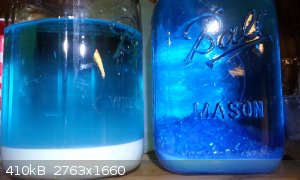RogueRose
International Hazard
    
Posts: 1596
Registered: 16-6-2014
Member Is Offline
|
|
White sediment/precipitate in Cu + H2SO4 + H2O2 reaction
A very fine white sediment is forming in my reaction with 50% H2SO4, Cu & ~25% H2O2 (added as needed when bubbling stops). Anyone know what this
may be?
|
|
|
MeshPL
Hazard to Others
  
Posts: 329
Registered: 20-4-2015
Location: Universe
Member Is Offline
Mood: No Mood
|
|
Maybe it is Cu2SO4? It should dissolve once you add more H2O2, I think.
|
|
|
symboom
International Hazard
    
Posts: 1143
Registered: 11-11-2010
Location: Wrongplanet
Member Is Offline
Mood: Doing science while it is still legal since 2010
|
|
I did read there is a stabilizer added to hydrogen peroxide if I remember its a very small amount of phosphoric acid
Some household peroxide states this on the label although very rare.
[Edited on 24-4-2016 by symboom]
|
|
|
morsagh
Hazard to Others
  
Posts: 187
Registered: 20-2-2014
Member Is Offline
Mood: No Mood
|
|
Cu2SO4 isn´t stable in water solution and at the moment disproportionate to Cu and CuSO4. You should try to more dilute solution with water.
|
|
|
Boffis
International Hazard
    
Posts: 1886
Registered: 1-5-2011
Member Is Offline
Mood: No Mood
|
|
In the presence of high concentrations of sulphuric acid copper sulphate tends to crystallise as lower hydrates that are paler than the pentahydrate;
they may be an explanation and is easily tested since the white precipitate would be easily soluble in fresh water. If due to phosphate ions or such
like they probably wouldn't dissolve.
|
|
|
RogueRose
International Hazard
    
Posts: 1596
Registered: 16-6-2014
Member Is Offline
|
|
I tried filtering the solution and the white precip goes right through 2ply coffee filter paper! It does seem that the liquid isn't as blue as
another jar that has the precipitated crystals.
In the picture the one on the right is MUCH bluer than the left jar. I tried adding 20ml 54% w/w H2SO4 to each jar to see if there was any reaction
and none was observed. I then added 20ml of hot water to each and crystals precipitated at the surface of the jar on the right.
I'm curious what the white precip is. I think when I had some in a beaker and added water, the water turned blue, crytals formed but when settled
there seemed to be the same amount of white precip on the bottom.
As a note, the precip seems exceptionally heavy so I think it must be either some kind of oxidized Cu.
EDIT - I just found that anhydrous CuSO4 is white so I think this is what it has to be.

[Edited on 4-5-2016 by RogueRose]
|
|
|
Brom
Hazard to Self
 
Posts: 94
Registered: 19-7-2015
Member Is Offline
Mood: No Mood
|
|
Anhydrous copper sulfate cannot be formed from an aqueous solution.
|
|
|
NeonPulse
Hazard to Others
  
Posts: 417
Registered: 29-6-2013
Location: The other end of the internet.
Member Is Offline
Mood: Isolated from Reality! For Real this time....
|
|
Anhydrous copper sulfate can't exist in water. It is made by strongly heating the hydrated copper sulfate salt to dehydration in a crucible or other
suitable flame resistant vessel. Have you dried any of the precipitate to see the colour of it dried?
|
|
|